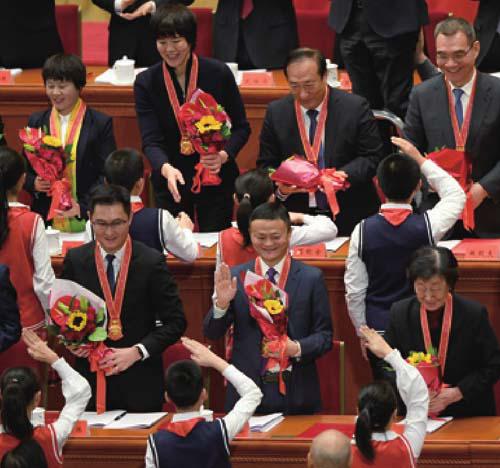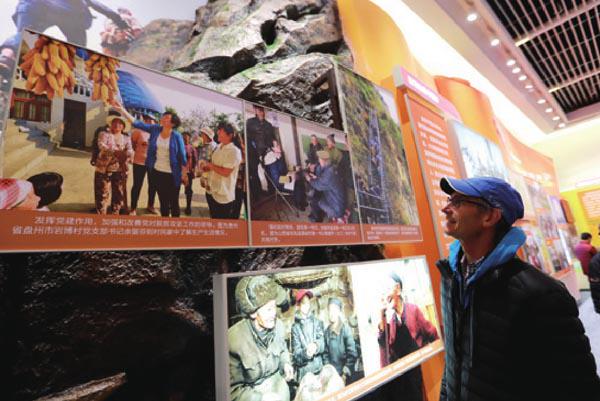PASSING ON THE BATON
2018-01-15ByLuYan
By Lu Yan
Although legendary e-commerce entrepreneur Jack Ma this year announced his plan to retire as executive chairman of the Alibaba Group by 2019, what he and his company have achieved will continue to impact China, and indeed, the rest of the world.
In 1999, with just 17 people, Ma founded Alibaba in his hometown Hangzhou, capital of east Chinas Zhejiang Province. Nearly two decades later, the e-commerce startup has grown into a hi-tech conglomerate with over 80,000 employees and a market value of around $400 billion.
There are countless reasons for Alibabas success. But perhaps the most prominent factor is reform and opening up China embarked on in 1978 and the economic and social progress it brought.
“Without the reform and opening-up policy, we wouldnt be who we are today,”Ma acknowledged at the annual conference of the Boao Forum for Asia held in Hainan in south China in April.
The relationship has been mutually beneficial. The success of enterprising and innovative companies like Alibaba in turn serves as the engine driving Chinas development.
At the celebration of the 40th anniversary of reform and opening up in Beijing on December 18, Ma was among the 100 Chinese receiving the Reform Pioneer medal. The others included entrepreneurs like Pony Ma, founder and CEO of Chinese tech giant Tencent, Baidu founder Robin Li, Nobel laureate scientist Tu Youyou, military personnel, economists, model workers, athletes, writers and artists.
An evolving roadmap
Honoring those who contributed to reform and opening up, the event, broadcast live on television and the Internet, was a signpost where the Chinese people can look back at the past and feel proud.
President Xi Jinping summed up the achievements of reform and opening up, calling it “a great revolution in the history of the Chinese people and the Chinese nation.”
When the drive began in 1978, the outside world was mostly developing fast along with technological advancement. But in China, following the end of the “cultural revolution” (1966-76), the economy was on the verge of collapse and the nation was in urgent need of rebuilding.
Confronted with the dire question of how Chinas socialist cause would advance after so many setbacks, then Chinese leader Deng Xiaoping underlined the need for reform.
“Our modernization program and socialist cause will be doomed if we dont reform now,” he said. “Unless we persevere in reform and opening up, we shall have no way out and no hope of modernizing the country.”
Deng said modernization was the “most important thing to set things right” and a“great cause which will determine our countrys destiny for generations to come.” “The fundamental task for the socialist stage is to develop productive forces,” he said.
Accordingly, the Third Plenary Session of the 11th Central Committee of the Communist Party of China (CPC), held in December 1978, saw the Party shift its focus toward socialist modernization. It was a significant turning point in the CPCs history.
The plenary session marked the beginning of the historic reform and openingup journey. At that time, China had a weak economy and a large population. The Central Government decided to conquer the challenges step by step. Deng proposed a three-step strategy in 1987 which was endorsed by the 13th National Congress of the CPC the same year.
The first step was to double the GNP and meet the basic living needs of the people. The second was to double the GNP again during the 1990s and achieve a moderately prosperous standard of living. The third step was to raise the economy to the level of a moderately developed country and modernize in another 30 to 50 years.
Today, China is pursuing the two Centenary Goals: to build a moderately prosperous society in all respects by 2021, when the CPC celebrates its centenary; and to transform China into a modern socialist country that is prosperous, strong, democratic, culturally advanced and harmonious by 2049, when the Peoples Republic of China celebrates its centenary.
Scenes of change
Wu Guosuan from Xiao Village in east Chinas Zhejiang Province has participated in the transformation. Xiao used to be under the poverty line. But as reform and opening up saw Chinas market economy develop, over 200 private toy factories sprang up in the village during the 1980s. The emergence of e-commerce boosted the industry.
Wu, as the pioneer entrepreneur in his village, opened his first online store on Tmall, Alibabas online business-to-consumer marketplace, in 2012. That year, the stores sales reached 3 million yuan ($436,700). Business grew fast, and Wu opened three more online stores. The sales in 2017 were over 60 million yuan ($8.74 million).
Currently, over three fourths of the 200-plus households in the village own more than 600 online stores with sales over 200 million yuan ($29.11 million) in 2018. The store owners are now seeking cooperation with multinational brands and tapping the international market to usher in the next development phase.
“I feel very happy. I now have money to buy my own house and car,” a beaming Wu told Beijing Review.
Such stories of transformation from poverty to prosperity can be found in many villages across the country. According to Liu Yongfu, Director of the State Council Leading Group Office of Poverty Alleviation and Development, over the past 40 years, 740 million people in China have worked their way out of poverty and made a major contribution to global poverty alleviation. China aims to eliminate rural poverty by 2020.
The rise of the Internet and entrepreneurship has helped rural areas like Xiao transform. The mass innovation and entrepreneurship initiative, proposed by Premier Li Keqiang at the Summer Davos Forum in 2014, embodies Chinas effort to seek innovation-driven development.
In 2016, Wu Hengkui founded SuperSymmetry Technologies, a startup specializing in financial research systems based on artificial intelligence, in Beijing.
“We are the product of reform and opening up. Without it, startups like us wouldnt even exist,” Gabriel Morris, the companys co-founder, told Beijing Review. The 32-year-old American left Goldman Sachs to become the Chinese companys chief operating officer.
Wu said the Next Generation Artificial Intelligence Development Plan issued by the State Council, Chinas cabinet, in July 2017 offers opportunities for startups like theirs to be part of the national strategy.
Entrepreneurship and innovation play a positive role in stimulating market vitality and creating jobs, Li said at the opening of the national mass entrepreneurship and innovation week in Chengdu, southwest Chinas Sichuan Province, on October 9. He said more efforts are required to better implement the innovation-driven development strategy and realize quality development.
An open market, strong and targeted policy support, successful poverty reduction strategy, peoples entrepreneurial enthusiasm and a vibrant society have all contributed to Chinas economic growth. According to the National Bureau of Statistics (NBS), Chinas GDP rose 33.5 times from 1978 to 2017, with an average annual growth of 9.5 percent, much higher than the world average of about 2.9 percent during the same period.
The gross national income per capita in 2017 ranked 95th among 217 countries and regions, according to the World Bank, an impressive achievement for a country that started low and has a large population base. At the end of 2017, Chinas foreign exchange reserves reached $3.14 trillion, the highest worldwide.
Progress is also evident in literacy, the education structure, public cultural undertakings, health and sports. China has built the worlds largest social security system, with basic old-age pension covering more than 900 million people and medical insurance covering over 1.3 billion people, Xi said at the celebration in December.
“China has maintained its social stability over a long period, making it one of the countries that provide the greatest sense of safety in the world,” he said.
“Chinas reform movement is one of the most significant global developments of the last century—perhaps in all of history. No nation anywhere has ever grown its economy so large so quickly,” Bruce Pickering, senior advisor at Asia Society, a New York-based non-profit organization, told Beijing Review.
Sharing development
In the 40 years, China has also pursued common development with other countries.
At the beginning of reform and opening up, only a few Chinese companies had business overseas. But from 1980 to 1988, with the establishment of five special economic zones in Shenzhen, Zhuhai and Shantou in Guangdong Province, Xiamen in Fujian Province, and the entire Hainan Province, business interactions with foreign enterprises became frequent. In 1984, 14 coastal cities opened their doors to overseas investors. With Chinas accession to the World Trade Organization in 2001, Chinese companies accelerated their pace of going out. Since 2003, China has established free trade zones in several countries and regions, boosting global imports and exports. In 2017, Chinese investors spent $120 billion in 6,236 enterprises in 174 countries and regions, 40 times more than in 2003, according to the Ministry of Commerce and the NBS.
In 2013, Xi proposed the Belt and Road Initiative, a global vision aiming to promote shared prosperity of humanity by cooperation on trade and infrastructure. In 2017, nonfinancial outbound direct investment (ODI) in countries involved in the Belt and Road Initiative totaled $14.4 billion, 12 percent of the total ODI.
China has also advanced economic globalization and global governance reform, contributing Chinese wisdom and approaches to resolving global issues. In recent years, it has hosted a number of international conventions such as the Belt and Road Forum for International Cooperation, the Asia-Pacific Economic Cooperation Summit, the G20 Summit and the annual Boao Forum for Asia conferences, where it has shared its experience with people from all around the world.

Chinas development provides successful experience and offers a bright prospect for other developing countries as they strive for modernization, representing Chinas contribution to the progress of human civilization, Xi said in December.
“China has shown African countries … that we should come up with our own development plans based on our own history, national conditions and characteristics. Its obvious that[the Chinese] method works,” Ibrahima Niang, Executive Director of the Institute of Asian and African Studies of Sahel, Senegal, told Beijing Review.
China has joined over 100 inter-governmental organizations and signed more than 300 international treaties, taking part in global cooperation ranging from anti-terrorism work to the battle against global warming.
“An important factor which enabled China to reach its economic heights has been the favorable global trading environment—one whose rules have been in place since the end of World War II. These rules, primarily initiated by the U.S. and Great Britain, have been underpinned by a range of economic and financial institutions and agreements. The IMF, the UN, the World Bank (including the International Bank for Reconstruction and Development), the Organization for Economic Cooperation and Development and various free trade agreements are all part of a system designed to bind the participating nations into a rules-based order,” Pickering said.
“China cannot develop itself in isolation from the world, and the world needs China for global prosperity,” Xi said at the December 18 celebration, underlining the commitment to opening up wider and promoting joint efforts to build a community with a shared future for humanity.
What the future holds
The past 40 years were the beginning. In the future, reform and opening up will continue. What has been achieved in economic, political, cultural, social and ecological fields must be shared among all, according to Xi.
“The people-oriented approach must be adhered to and efforts should be made to keep delivering on the peoples aspirations for a better life,” he said.
“Bearing in mind Chinas internal and international situations, we have stayed committed to the fundamental national policy of opening up, followed a proactive approach to opening up, and entered a new stage of comprehensive, multi-level and wideranging opening up, thus creating a sound international environment and broader development space for China,” Xi said at the December 18 gathering.
The president likened realizing socialist modernization and national rejuvenation to a relay race. “The baton should be passed on for generations and each generation should achieve a good result for the next generation,” he said.
